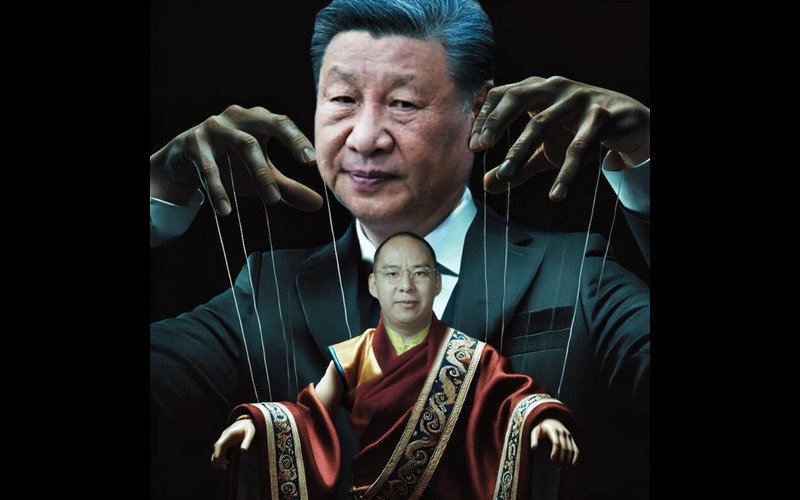China's Panchen Lama's Visit Stopped? Nepal Aaja Exclusive Reveals How

Kathmandu, Nepal – The potential visit of China's officially recognized Panchen Lama, Gyaltsen Norbu, to Nepal has raised significant diplomatic concerns. On December 10, 2024, Nepal Aaja published an exclusive report warning that the visit could place Nepal in a geopolitically challenging position.
Following the report, the Nepalese government has taken the sensitivity of Panchen Lama's visit seriously. While the visit have been halted, the issue has raised critical questions, particularly about the role of Lyarkar Lama, Vice Chairman of the Lumbini Development Trust, in facilitating such a controversial visit.
Background of Panchen Lama
In 1995, China bypassed the traditional Tibetan Buddhist process and appointed Gyaltsen Norbu as the 11th Panchen Lama. This move disregarded the earlier recognition of Gedhun Choekyi Nyima by the Dalai Lama. The disappearance of Gedhun Choekyi Nyima sparked international condemnation, with Tibetan communities strongly opposing China's interference.
Gyaltsen Norbu's legitimacy as a religious leader remains highly contested. Critics argue that China uses him as a political tool to assert control over Tibetan Buddhism.
The Potential Visit and Government's Response
After Nepal Aaja's report highlighted the geopolitical risks of hosting Gyaltsen Norbu, the Nepalese government responded swiftly. Despite preparations by Chinese stakeholders to bring the Panchen Lama to Lumbini, senior government officials have actively worked to address the issue's sensitivity and prevent the visit.
This situation has placed a spotlight on Lyarkar Lama, who has been criticized for his involvement in managing the arrangements for the Panchen Lama's visit.
Controversial Background of Lyarkar Lama
Lyarkar Lama's history is fraught with legal, moral, and professional controversies, making his role in the Lumbini Development Trust highly contentious.
-
The Ammunition Scandal:
On December 15, 2015, Kathmandu police discovered 14 bullets in Lyarkar Lama's locker at the Nepal Investment Bank. The possession of such items by a Buddhist monk raised severe legal and ethical concerns. -
Judicial Rulings:
The Kathmandu District Administration Office fined Lama NPR 28,000 (approximately NPR 2,000 per bullet) for the possession of ammunition. This leniency, compared to the harsh sentences typically imposed for similar offenses, drew significant public criticism. -
Moral and Ethical Questions:
As a Buddhist monk, Lama's association with lethal weapons contradicts the principles of peace and non-violence. This incident, combined with other allegations, raises serious questions about his integrity and suitability for leadership roles.
Appointment as Vice Chairman of the Lumbini Development Trust
Lyarkar Lama's appointment as Vice Chairman of the Lumbini Development Trust has been equally controversial.
- According to Nepal's Ministry of Culture, Tourism, and Civil Aviation regulations, individuals with proven criminal records are ineligible for such positions.
- Despite this, then-Tourism Minister Sudan Kirati recommended Lama for the role, and the appointment was approved by the cabinet under Prime Minister Pushpa Kamal Dahal (Prachanda).
This decision violated legal norms and undermined the moral and ethical standards expected of someone tasked with overseeing the sacred site of Lumbini, the birthplace of Buddha.
Nepal's Neutrality and Geopolitical Challenges
Nepal has historically maintained a neutral stance between its two powerful neighbors, China and India, while upholding its religious independence. However, Panchen Lama's potential visit could have disrupted this balance.
- Nepal’s Image:
Lumbini is recognized globally as a symbol of peace and non-violence. Hosting a controversial figure like the Panchen Lama could have tarnished Nepal's image as a neutral and inclusive nation. - Reactions from India and the International Community:
India and other international stakeholders might view the visit as China's attempt to expand its influence in the region through religious diplomacy.
Impact of Nepal Aaja's Report and Conclusion
Nepal Aaja's exclusive report has had a significant impact, prompting the government to act on the issue. While the Panchen Lama's visit now seems unlikely, the controversy has underscored the deeper problem of appointing individuals like Lyarkar Lama to key positions.
Nepal must ensure that sacred sites like Lumbini are managed by legally and morally credible individuals. The government must also safeguard its diplomatic integrity by balancing relationships with its neighbors while preserving Nepal's independent cultural and religious identity.




![From Kathmandu to the World: How Excel Students Are Winning Big [Admission Open]](https://nepalaaja.com/img/70194/medium/excel-college-info-eng-nep-2342.jpg)
